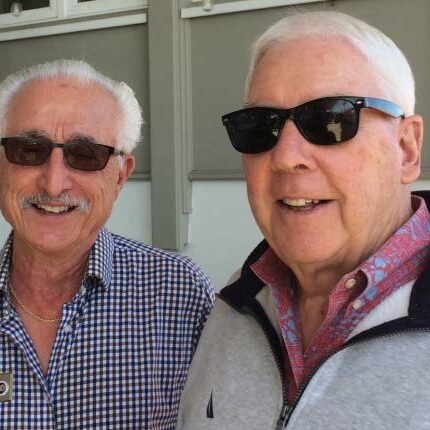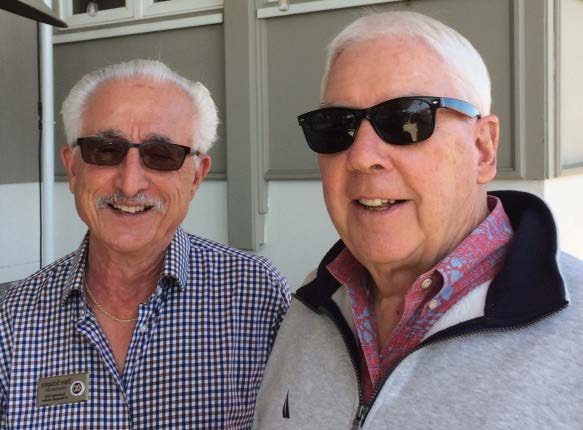ZOOM/LIVE MEETING
There were 17 in attendance on the outside patio of the BCYC, including two guests of Dr. Bob Wood and Roy Schlemon: Bernie Rubio, who is the manager of the Fitness Authority gym on Old Newport; and Scott Uhl, who serves as their personal fitness trainer there. This is Bernie’s second consecutive guest appearance at our luncheon meeting.


Joining us on Zoom were five additional members. Good news! It was announced that effective March 11th, the BCYC will again be permitting us to have our luncheon meetings indoors.
The meeting began with an invocation led by Dr. Bob, who noted that, in these troubling times, we are grateful for the beautiful community and for our great nation in which we live. He asked for heavenly guidance to our leaders to know the difference between right and wrong, to our Club’s commitment to recognizing students and the organizations we helped sponsor. He prayed that there would be worldwide respect for the Golden Rule. President George Lesley continued with trivia about our Solar System: we learned that, in a spacecraft traveling at 25,000 mph, it takes 3 days to go to the moon, 6.5 months to reach Mars, 15 months to Venus, 6 years to Jupiter, 6.5 years to Mercury, 7 years to Saturn, and 12 years to Neptune!
Pres. George introduced our member and retired pharmacist Dave Schapiro (also your editor of this issue), who was asked to update and try to make sense of the information (and misin-formation) about the vaccines from print and electronic media. Dave began with a few caveats: That the information available has been overwhelming, often conflicting, and is evolving rapidly; such that what may make sense today will not necessarily be acceptable tomorrow…..That everyone is entitled to make their own decisions to be vaccinated…..That the veracity of the information available is only as reliable as the sources from which it is obtained; Dave mentioned that his sources have included respected peer-reviewed journals, including Lancet, NEJM, JAMA, and Med-scape…..That the political implications of the vaccination process as well as how the COVID-19 pandemic is being handled by our government(s) are beyond the scope of this presentation.
Dave then presented his answers to the questions that most would likely be asking:
Should you get vaccinated? Since the great majority of those in attendance (including yours truly) have already received at least one dose of the vaccine, the answer would only apply to those who haven’t. For the general population, vaccination (and/or herd immunity via infection with COVID-19) is the principal goal. Right now, data is inconsistent and often contradictory as to whether or now a person who has been vaccinated can still be a carrier (i.e. can transmit the virus to others who have not been vaccinated). At least 3 studies out of Israel suggest that the Pfizer vaccine can reduce viral transmission, but researchers are cautioning that such studies need to be expanded to include larger populations. Children under 16 years are currently not on the list to be vaccinated, but may still be carriers and capable of transmitting the virus whether or not they become symptomatic. However, the vaccine manufacturers are currently engaged in studies regarding their safety and effectiveness in school-age children…..The death rate in the elderly with a documented COVID-19 infection is about 5%. The death rate attributable to the vaccine is less than 2 per million (0.0002%). Statistically, the benefits of vaccination clearly outweigh the risks…..If you travel, are employed by the government, or just want to see your children or grandchildren, you would consider vaccination.
Is one vaccine better than another? The vaccines that are currently available against COVID were released by the FDA under an Emergency Use Authorization (EUA). They have been tested in accordance with standard FDA protocols for safety and effectiveness, and are all undergoing continuing evaluation for longer-term adverse effects. Technically, the FDA has not formally approved any COVID-19 vaccine to date, and they are still experimental, The Pfizer and Moderna vaccines are mRNA products which, on the one hand,, require two doses to achieve 95% effectiveness. The soon-to-be released Janssen/J&J Vaccine is a single-dose preparation that is 60-70% effective in protecting against symptomatic COVID and will prevent virtually all hospitalizations. If you are planning to be vaccinated, and you currently have an appointment for a first dose you most likely will be getting the Pfizer or Moderna product. If for some reason, you are delayed in receiving your first dose of vaccine and you have only the J&J product as an option, you should take it: the coverage is more than adequate.
Should you be getting vaccinated if you have already tested positive for COVID? The CDC is currently recommending that patients who have tested positive for COVID receive the vaccine. Studies are continuing to determine both the anti-body responses from patients who have been infected as well as patients who have been vaccinated, but it looks like the immune response from either is similar, with the hope that antibodies remain for at least six months.

What if you receive the first dose, but your second dose is delayed? The time frames established for the two-dose vaccines will probably be adjusted over time as new data become available. Administration of the booster dose 60-to 90 days or even 6 months after the initial dose would be likely.
For more information, please visit the CDC website at www.cdc.gov. For reporting of adverse reactions to the COVID vaccine, please visit the Vaccine Adverse Event Reporting System website at www.VAERS.hhs.gov.

